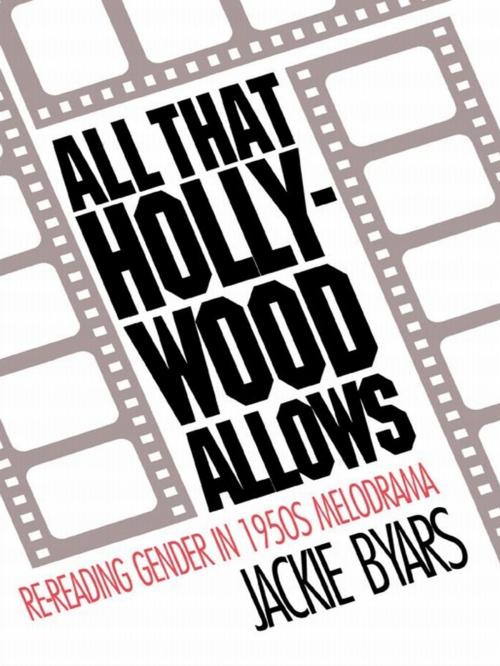All that Hollywood Allows
Re-reading Gender in 1950s Melodrama
Nonfiction, Entertainment, Film, History & Criticism, Performing Arts, Social & Cultural Studies, Social Science| Author: | Jackie Byars | ISBN: | 9781134910809 |
| Publisher: | Taylor and Francis | Publication: | September 2, 2003 |
| Imprint: | Routledge | Language: | English |
| Author: | Jackie Byars |
| ISBN: | 9781134910809 |
| Publisher: | Taylor and Francis |
| Publication: | September 2, 2003 |
| Imprint: | Routledge |
| Language: | English |
All that Hollywood Allows explores the representation of gender in popular Hollywood melodramas of the 1950s. Both a work of feminist film criticism and theory and an analysis of popular culture, this provocative book examines from a cultural studies perspective top-grossing film melodramas, such as A Streetcar Named Desire, From Here to Eternity, East of Eden, Imitation of Life and Picnic.
Stereotypically viewed as a complacent and idyllic time, the 1950s were actually a time of dislocation and great social change. Jackie Byars argues that mass media texts of the period, especially films, provide evidence of society's consuming preoccupation with the domestic sphere - the nuclear family and its values - and she shows how Hollywood melodramas interpreted and extended societal debates concerning family structure, sexual divisions of labour, and gender roles. Her readings of these films assess a variety of critical methodologies and approaches to textual analysis, some central to feminist film studies and some previously bypassed by scholars in the field.
All that Hollywood Allows explores the representation of gender in popular Hollywood melodramas of the 1950s. Both a work of feminist film criticism and theory and an analysis of popular culture, this provocative book examines from a cultural studies perspective top-grossing film melodramas, such as A Streetcar Named Desire, From Here to Eternity, East of Eden, Imitation of Life and Picnic.
Stereotypically viewed as a complacent and idyllic time, the 1950s were actually a time of dislocation and great social change. Jackie Byars argues that mass media texts of the period, especially films, provide evidence of society's consuming preoccupation with the domestic sphere - the nuclear family and its values - and she shows how Hollywood melodramas interpreted and extended societal debates concerning family structure, sexual divisions of labour, and gender roles. Her readings of these films assess a variety of critical methodologies and approaches to textual analysis, some central to feminist film studies and some previously bypassed by scholars in the field.















